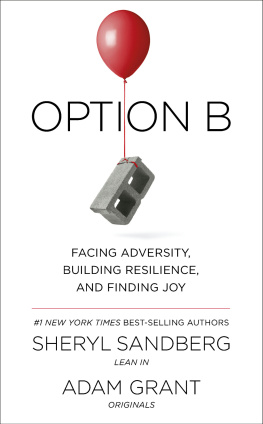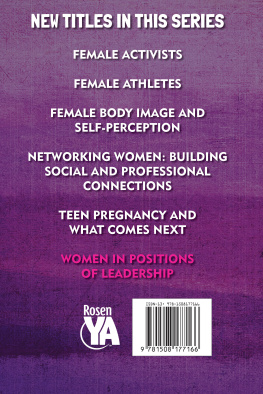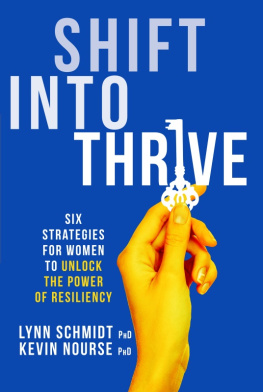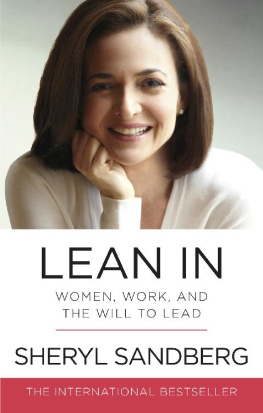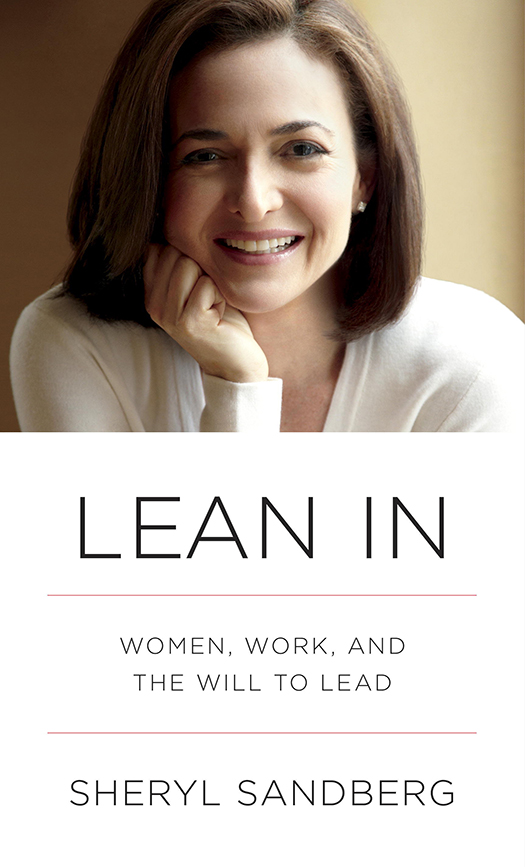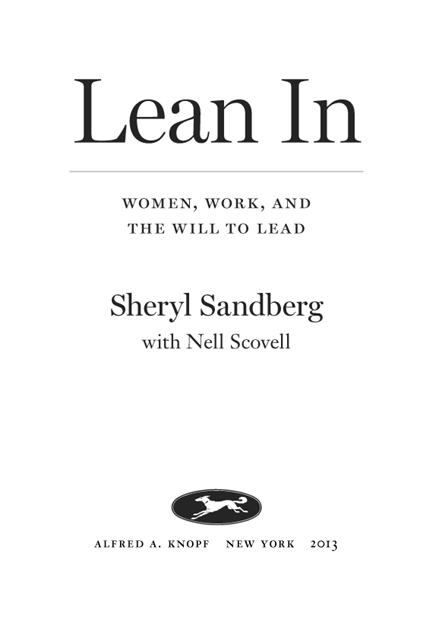THIS IS A BORZOI BOOK
PUBLISHED BY ALFRED A. KNOPF
Copyright 2013 by Lean In Foundation
All rights reserved. Published in the United States by Alfred A. Knopf, a division of Random House, Inc., New York, and in Canada by Random House of Canada Limited, Toronto.
www.aaknopf.com
Knopf, Borzoi Books, and the colophon are registered trademarks of Random House, Inc.
Library of Congress Cataloging-in-Publication Data
Sandberg, Sheryl.
Lean in : women, work, and the will to lead / Sheryl Sandberg.
First edition.
pages cm
eISBN: 978-0-385-34995-6
1. Women executives. 2. Leadership in women.
3. Sandberg, Sheryl. I. Title.
HD 6054.3. S 265 2013
658.4092082dc23
2012043371
Jacket photograph by Matt Albiani
Jacket design by Peter Mendelsund
v3.1
TO MY PARENTS
for raising me to believe that
anything was possible
AND TO MY HUSBAND
for making everything possible
Contents
1. The Leadership Ambition Gap:
What Would You Do if You Werent Afraid?
INTRODUCTION
Internalizing the Revolution
I GOT PREGNANT with my first child in the summer of 2004. At the time, I was running the online sales and operations groups at Google. I had joined the company three and a half years earlier when it was an obscure start-up with a few hundred employees in a run-down office building. By my first trimester, Google had grown into a company of thousands and moved into a multibuilding campus.
My pregnancy was not easy. The typical morning sickness that often accompanies the first trimester affected me every day for nine long months. I gained almost seventy pounds, and my feet swelled two entire shoe sizes, turning into odd-shaped lumps I could see only when they were propped up on a coffee table. A particularly sensitive Google engineer announced that Project Whale was named after me.
One day, after a rough morning spent staring at the bottom of the toilet, I had to rush to make an important client meeting. Google was growing so quickly that parking was an ongoing problem, and the only spot I could find was quite far away. I sprinted across the parking lot, which in reality meant lumbering a bit more quickly than my absurdly slow pregnancy crawl. This only made my nausea worse, and I arrived at the meeting praying that a sales pitch was the only thing that would come out of my mouth. That night, I recounted these troubles to my husband, Dave. He pointed out that Yahoo, where he worked at the time, had designated parking for expectant mothers at the front of each building.
The next day, I marched inor more like waddled into see Google founders Larry Page and Sergey Brin in their office, which was really just a large room with toys and gadgets strewn all over the floor. I found Sergey in a yoga position in the corner and announced that we needed pregnancy parking, preferably sooner rather than later. He looked up at me and agreed immediately, noting that he had never thought about it before.
To this day, Im embarrassed that I didnt realize that pregnant women needed reserved parking until I experienced my own aching feet. As one of Googles most senior women, didnt I have a special responsibility to think of this? But like Sergey, it had never occurred to me. The other pregnant women must have suffered in silence, not wanting to ask for special treatment. Or maybe they lacked the confidence or seniority to demand that the problem be fixed. Having one pregnant woman at the topeven one who looked like a whalemade the difference.
Today in the United States and the developed world, women are better off than ever. We stand on the shoulders of the women who came before us, women who had to fight for the rights that we now take for granted. In 1947, Anita Summers, the mother of my longtime mentor Larry Summers, was hired as an economist by the Standard Oil Company. When she accepted the job, her new boss said to her, I am so glad to have you. I figure I am getting the same brains for less money. Her reaction to this was to feel flattered. It was a huge compliment to be told that she had the same brains as a man. It would have been unthinkable for her to ask for equal compensation.
We are centuries ahead of the unacceptable treatment of women in these countries.
But knowing that things could be worse should not stop us from trying to make them better. When the suffragettes marched in the streets, they envisioned a world where men and women would be truly equal. A century later, we are still squinting, trying to bring that vision into focus.
The blunt truth is that men still run the world. Of the 195 independent countries in the world, only 17 are led by women.of any industry. This means that when it comes to making the decisions that most affect our world, womens voices are not heard equally.
Progress remains equally sluggish when it comes to compensation. In 1970, American women were paid 59 cents for every dollar their male counterparts made. By 2010, women had protested, fought, and worked their butts off to raise that compensation to 77 cents for every dollar men made.
I have watched these disheartening events from a front-row seat. I graduated from college in 1991 and from business school in 1995. In each entry-level job after graduation, my colleagues were a balanced mix of male and female. I saw that the senior leaders were almost entirely male, but I thought that was due to historical discrimination against women. The proverbial glass ceiling had been cracked in almost every industry, and I believed that it was just a matter of time until my generation took our fair share of the leadership roles. But with each passing year, fewer and fewer of my colleagues were women. More and more often, I was the only woman in the room.
Being the sole woman has resulted in some awkward yet revealing situations. Two years after I joined Facebook as chief operating officer, our chief financial officer departed suddenly, and I had to step in to complete a funding round. Since I had spent my career in operations, not finance, the process of raising capital was new and a bit scary. My team and I flew to New York for the initial pitch to private equity firms. Our first meeting was held in the kind of corporate office featured in movies, complete with a sprawling view of Manhattan. I offered an overview of our business and answered questions. So far so good. Then someone suggested that we break for a few minutes. I turned to the senior partner and asked where the womens restroom was. He stared at me blankly. My question had completely stumped him. I asked, How long have you been in this office? And he said, One year. Am I the only woman to have pitched a deal here in an entire year? I think so, he said, adding, or maybe youre the only one who had to use the bathroom.
It has been more than two decades since I entered the workforce, and so much is still the same. It is time for us to face the fact that our revolution has stalled.The promise of equality is not the same as true equality.
A truly equal world would be one where women ran half our countries and companies and men ran half our homes. I believe that this would be a better world. The laws of economics and many studies of diversity tell us that if we tapped the entire pool of human resources and talent, our collective performance would improve. Legendary investor Warren Buffett has stated generously that one of the reasons for his great success was that he was competing with only half of the population. The Warren Buffetts of my generation are still largely enjoying this advantage. When more people get in the race, more records will be broken. And the achievements will extend beyond those individuals to benefit us all.


